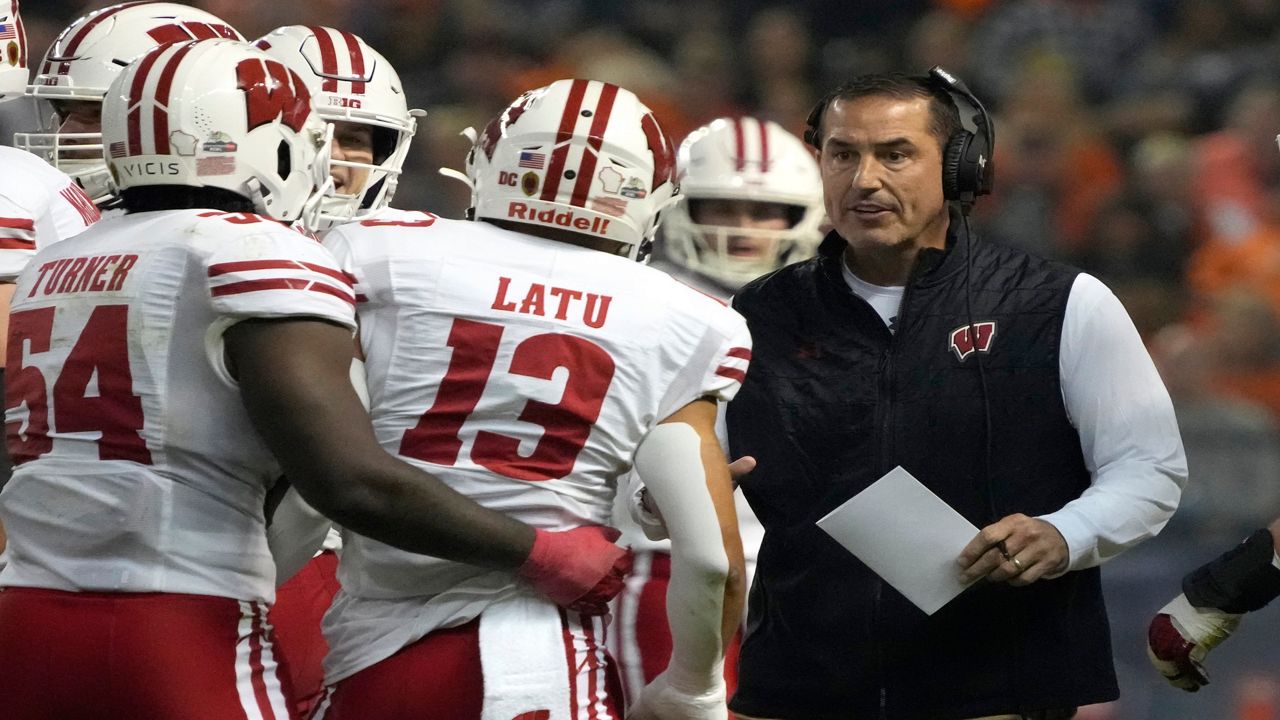New coaches often spend their first several months dwelling on the need to instill a different culture into their programs.
Consider Wisconsin’s Luke Fickell an exception.
Fickell says the Badgers already have what he calls a “really good footprint,” something backed up by Wisconsin’s 21 consecutive bowl appearances. He just wants to find ways to boost it as the former Cincinnati coach prepares to start his first spring practice at Wisconsin on March 25.
“Sometimes the biggest mistake you can do is you go into a place thinking you’re just going to completely change the culture,” Fickell told The Associated Press in an interview. “You can enhance and do things the way you want to do them, but I think by nature a lot of places have unique cultures, especially here, that have been kind of bred for a long time.”
Fickell believes the lack of rampant roster turnover following a tumultuous coaching transition offers testament to that culture.
Wisconsin fired Paul Chryst on Oct. 2, a day after a 34-10 home loss to Illinois. Athletic director Chris McIntosh hired Fickell after many players had called for popular defensive coordinator and interim head coach Jim Leonhard to get the job.
Yet the Badgers didn’t lose many major contributors to the transfer portal aside from three-year starting quarterback Graham Mertz, now at Florida. Offensive lineman Michael Furtney and wide receiver Markus Allen entered the transfer portal but then decided to stay.
Most notably, Wisconsin managed to hang on to two-time 1,200-yard rusher Braelon Allen. Fickell said he reached out to Wisconsin’s current players by reminding them why they signed there in the first place.
“I kind of sold it as just because I’m new, just because you don’t know me, trust and believe that the things that brought you here and the things that have kept you here so far are the same things that are going to be what you love when you finish up here,” Fickell said.
But there will be notable differences under Fickell, who went 57-18 at Cincinnati and led the Bearcats to a College Football Playoff appearance in 2021.
Those changes should be most apparent on offense.
New offensive coordinator Phil Longo ran a variation of an Air Raid attack during his four seasons in the same position at North Carolina and intends to bring some of that to Wisconsin. Although Longo has said running the ball will remain a priority, his arrival represents a dramatic shift for a program known for its ball-control offenses.
“It will be a different tempo and pace to what they’ve seen maybe offensively here for a while,” Fickell said. “But when you really go to study it, it’s still going to be about being physical. It’s still going to be about being able to run the football and control the line of scrimmage.”
There also are plenty of new faces.
Since Fickell’s arrival, Wisconsin has added 15 transfers, including two walk-ons. Tanner Mordecai, who threw a school-record 72 career touchdown passes at SMU, is one of three quarterback transfers on Wisconsin’s roster.
Fickell says he would prefer to take no more than three or four transfers per year moving forward. He noted that most of his incoming transfers have at least three more years of eligibility, giving the new staff more of a chance to develop them.
“I would not want to be in the transfer quarterback world,” Fickell said. “I just don’t think that’s the way you continue to sustain and build a program. Obviously we took three of them this year. We had low numbers in that room, so we had to do it.”
Wisconsin reached the Rose Bowl as recently as the 2019 season but hasn’t won a Big Ten title since 2012 and has gone 20-13 over the last three seasons, including a 7-6 mark last year. That’s a step back for a program that played in six of the first nine Big Ten championship games and won the first two.
Perhaps a new approach can prove beneficial.
“The footprint’s there, but it just gets a little bit faded at times,” Fickell said. “Sometimes that’s when change isn’t bad. I told my own son (Cincinnati offensive lineman Landon Fickell) that as I left Cincinnati. I said: ‘The culture is embedded here. Someone’s going to come in and adapt and adjust things a little bit. In some ways, that can give you a chance to be greater.’
“I feel the same way here. Recognize the things that are really, really good and then make sure that you can enhance the things that you know are important for what you want to do and how you want to do them.”



